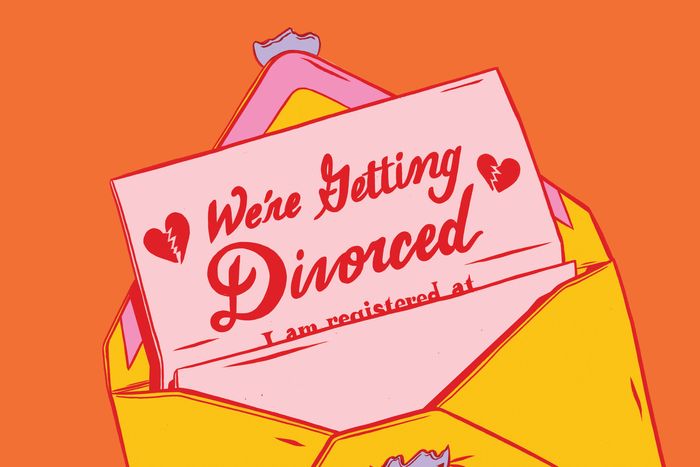A friend of mine got divorced not long ago. Her new apartment is clean and quiet, and every single object in it vibrates with significance. Here is the kettle. Here are the light fixtures chosen hastily out of necessity.
Divorce brings inanimate objects to life. The sheets you slept on, the kitchen clock that oversaw your morning routine, the wooden spoon that stirred the chili — these can conspire against someone who is trying to start life over, threatening to suck them back through a wormhole to the past.
The belief that our stuff has the power to help us or hold us back inspired sisters Olivia Dreizen Howell and Genevieve Dreizen to set up the Fresh Starts Registry. By 2021, both were out of long-term relationships; Genevieve had ended an engagement not long after Olivia had gotten a divorce. Now, they help people create registries so a community can assist them in setting up a new household.
“We don’t see these things as gifts,” Olivia tells me. “This is a support registry. It’s not about the sheets and towels; it’s about the decisions that you’re making to make a big change.”
The timelines of life’s big milestones have changed — despite some recent setbacks in life expectancy, we’re living longer and marrying later than we were decades ago. Our gifting conventions should change as well. Until the 1960s, it was rare for couples to live together before marriage, so a wedding registry was crucial for establishing a livable home. These days, couples often get married with all the cutlery they need but no money for a honeymoon (or to pay the rent, for that matter). Cue the honey fund.
Even as divorce rates have slowed a bit, divorce remains popular. We keep finding ourselves alone in empty apartments with a duffel bag of clothes and a mishmash of objects that remind us of a previous life.
The Fresh Starts Registry offers curated room collections (kitchen, bedroom, bathroom, kids’ rooms) and “bundles” of basics on Amazon. The $99 bundle gets you sheets, towels, cutlery, and a toothbrush set. It’s no frills, but the care put into the curation has a comforting effect. How many recently divorced people have abandoned a search for new sheets simply because the act of sifting through the garbage of inane reviews is too much to bear?
My friend Sophie Donelson, a design writer and consultant who is in the process of a divorce, sees a divorce-gift registry as a way for friends to “do some emotional labor out loud.” When it comes to faraway loved ones sending their support, it beats flowers. “Reactions to the news of a divorce are often ‘I’m so sorry,’” she says. “How about a little ‘Here’s to new beginnings!’ or just ‘Wow, that’s big. What can I do?’ I could see that a registry would offer people a concrete way to help. You could tell a friend, ‘Hey, I’m rebuilding my life — starting with stuff.’ There’s no playbook for modern divorce, but a registry could create a way to acknowledge the issue without delving too deep.”
The convenience of an Amazon order may sidestep some of the emotional needs that a new set of sheets might not respond to. People also need someone to pick the kids up from soccer, to help rearrange the furniture, and to drop by unexpectedly just so life feels normal and okay.
“Forks are an easy problem to solve,” says author Kimberly Harrington, who writes about her life post-marriage in a newsletter. “What you really want are people to show up for you — that’s what people are asking for in those moments of change. What I would have liked was for friends to be more available to hang out and go get drinks. I want to host people and for people to be hanging out in my apartment.”
Divorce when young children are involved presents different kinds of pain and logistics. Kids’ realities are mapped to their material worlds. The presence of a special cup can set an anxious child at ease. Creating a new safe place for them is an existential imperative. Older kids don’t require the same degree of continuity after their parents split. Harrington’s divorce happened after she had turned 50 and her children were almost out of the house. “When I was getting divorced, I wanted to pick stuff out myself,” says Harrington. “It was my opportunity to stake my ground in my house. I was surprised at how meaningful that was to me. I can get navy-blue pots if I want! So I guess that makes a case for the registry. But at the same time, at this point in my life, I’ve got more stuff than I can handle. And what it really comes down to during these big changes is your community.”
We may need new stuff, but what many of us really want is for our housewares to become invisible again through use by our loved ones. We want our mugs to warm our friends’ palms, not sit neatly in a little row.
Businesses like Fresh Starts want to be part of the destigmatization of divorce. They want divorce to be seen as it should be: a life change like any other rather than a shameful detour. Maybe commerce is the only way to find us where we live. A lot of our feelings show through how we consume. Can a convenient way to shop for one another bring us closer to a world in which divorce is widely socially accepted as a transition instead of a failure? Probably not. But if we start by buying people things after divorce — performing an act of encouragement, not an act of pity — maybe it’ll change the culture’s view of life after marriage. Loneliness persists, and cheap stuff proliferates. We work with what we have.

